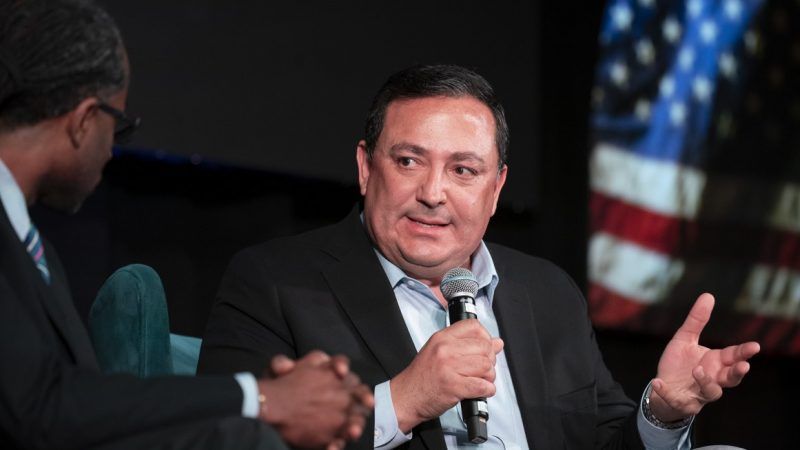Houston Police Chief Tries To Blame Encryption for Failure To Uncover Far-Right Cops
Meanwhile, he’s still trying to downplay corruption within his own force.

Several police officers were among the mob that invaded the U.S. Capitol on January 6, a fact that has prompted some serious questions for law enforcement agencies about what they're doing to tackle the far-right presence in their departments. An article in Monday's Washington Post discusses how police might work to recognize problematic recruits before they're hired, and how to make it easier to discipline officers who express violent political attitudes—a challenge as cop-friendly arbitrators often intervene and force law enforcement agencies keep them on board.
Deep down in the Post story, the debate takes a comically absurdist twist. A former Houston police officer was among those charged with joining the violent mob at the Capitol. With the problem at his doorstep, Houston Police Chief Art Acevedo, who is also president of the Major Cities Chiefs Association, decided to blame…encryption:
Acevedo also said anonymous online platforms on the "dark web" are making such investigations impossible, even for departments with sufficient resources. He expects the move away from public platforms like Facebook and Twitter to grow rapidly in response to the FBI arrests of those who rioted at the Capitol.
This month, Acevedo was asked by the House Oversight and Reform Committee to explain what actions police chiefs are taking, and responded by asking for help. For years, law enforcement officials have asked for passage of a federal law that would require such platforms to have a "back door" that law enforcement can access if they have "a legitimate investigative need and a court order" to gain entry.
"Congress's failure to act has enabled industry giants to flaunt the law and operate with impunity," Acevedo wrote in response.
Destroying encryption—and yes, mandatory backdoors would utterly destroy encryption—has been a pet cause of the U.S. Department of Justice for years. The invocation of the "dark web" as a boogeyman has been a constant recently too. Usually those who have demanded encryption back doors have insisted that it was necessary to fight child trafficking and terrorism.
It feels a bit desperate to invoke encryption as a reason why police departments don't know they've got some dangerous officers, particularly when—let's be frank—these guys weren't being all that secretive. As the Brennan Center for Justice notes, "These officers' racist activities are often known within their departments, but only result in disciplinary action or termination if they trigger public scandals."
Meanwhile, Acevedo has inadvertently revealed that people are right to worry that law enforcement would abuse encryption backdoors. Police leaders have traditionally insisted that they need these to make sure tech platforms and communication tools comply with legal warrants. But Acevedo is talking about using backdoors to investigate potential or current police officers without any specific connection to criminal activity. This isn't crimefighting; it's domestic surveillance. This is precisely why backdoors are dangerous. Worse yet: The whole premise of these investigations is that there are abusive, authoritarian cops out there who can't be trusted. This is supposed to be a reason to give officers more access to people's communications?
It's absolutely disheartening to see coverage of encrypted communications that suggests apps like Signal or Telegram are problems because they do not (and cannot) police content, therefore allowing extremists to communicate with each other. A tool can be used for good reasons or bad. We don't throw away hammers and move back into caves because they can also be used to beat somebody to death.
To reiterate for the umpteenth time, encryption protects us from criminals, hackers, and authoritarian governments. What Acevedo proposes won't help fight crime. It would actually make us more likely to be victims of crime. And that doesn't even get into what happens when some of our more violent governments across the world start using the backdoors precisely the way Acevedo describes, but against citizens trying to organize for more freedom, not just to cancel an election whose outcome they didn't like.
We shouldn't be surprised Acevedo that doesn't know what his cops are up to. For years, right under his nose, corrupt narcotics officers have been involved in a racket that involved falsifying records, which culminated in 2019 in a botched raid where officers killed a couple. As Reason's Jacob Sullum noted just this week, Acevedo is still trying to defend some of the officers involved and maintaining that there are not systemic problems in his department. What good would backdoors be to a man who refuses to acknowledge the evidence that's already in front of him?

Show Comments (76)